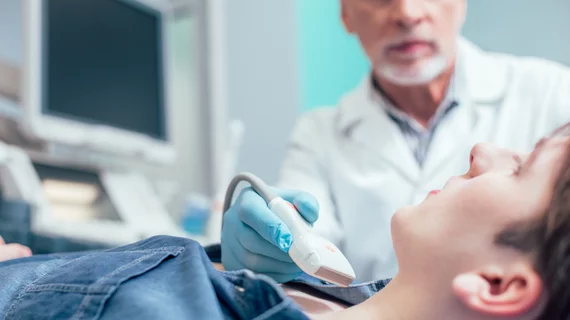AI reads of neck ultrasounds could displace thyroid biopsies
Upon training a machine learning model to analyze ultrasound images of the neck, researchers tested their algorithm and have found it correctly flagged likely cancerous nodules of the thyroid gland at a 97% clip.
That rate compares favorably with sensitivity achieved in thyroid biopsies with fine needle aspiration, notes lead researcher Nikita Pozdeyev, MD, PhD, of the University of Colorado Anschutz Medical Campus.
Pozdeyev presented the work June 13 at ENDO 2022, the Endocrine Society’s annual meeting in Atlanta, also reporting that the AI ruled out cancer with 61% specificity.
Pozdeyev said his team trained the model on more than 30,000 sonograms of 621 thyroid nodules and externally validated its results using 145 nodule images acquired at another healthcare system.
If the results hold up in prospective clinical trials, he emphasized, the AI could end up saving patients from undergoing unneeded biopsies.
“We demonstrated that using AI analysis of ultrasound images to rule out thyroid cancer and avoid biopsy is definitely possible,” Pozdeyev said. “This technology could assist radiologists and endocrinologists in choosing which thyroid nodules should undergo biopsy, especially those in the community who may not review a large number of thyroid ultrasound images.”
The Endocrine Society notes that fine-needle aspiration biopsy, the gold standard test for thyroid cancer diagnostics, usually brings back benign results and so could stand to be replaced with a lower-risk exam like neck ultrasound.
More Coverage of Thyroid Imaging:
Deep learning and rads comprise an ‘efficient pipeline’ for detecting, classifying thyroid nodules
Follow-up ultrasound for incidental thyroid nodules on CT not always cost-effective
‘Surprising’ widespread variation in payer-negotiated thyroid imaging prices
FDA clears ‘world’s first’ artificial intelligence tool to simplify thyroid ultrasound scans
Automated and structured reporting for thyroid ultrasound drops errors down to zero
AI uses imaging findings to predict presence of thyroid nodules

